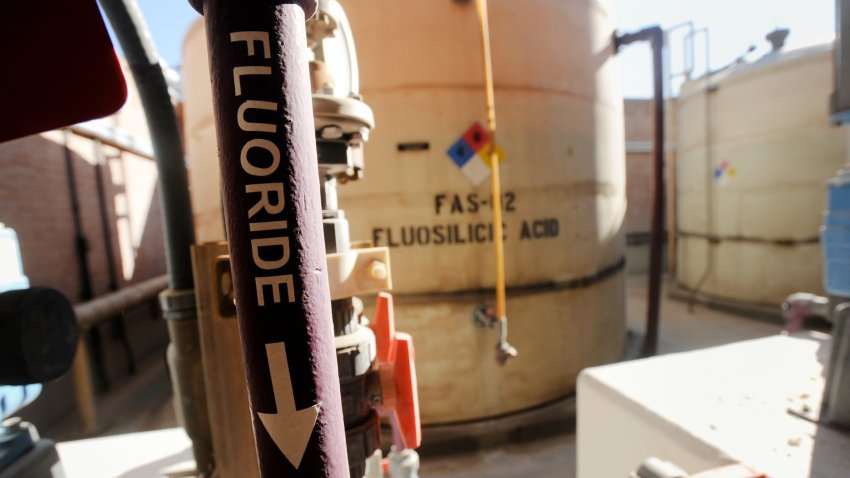-

What to know about Robert F. Kennedy Jr., Trump's pick for health secretary
Robert F. Kennedy Jr. has promoted claims about vaccines that contradict the overwhelming consensus of scientists.
-

Survey finds 2 in 5 Americans worry about overeating over the holidays
A new survey from Orlando Health found 39% of American adults worry about how much they will eat over the holidays, but dietitians say fears of weight gain or other negative effects are overblown.
-

Study finds beer drinkers have less healthy lifestyles than wine drinkers
A study from the American Association for the Study of Liver Diseases found beer drinkers usually have less healthy lifestyles than drinkers who prefer wine, liquor or a combination of alcohol types.
-

More women seek testosterone therapy, prompted by influencers, doctors say
With the rise of telemedicine and testosterone replacement clinics opening up across the country, access to the drug has never been easier.
-

Will fluoride go away when Trump takes office?
Dentists say fluoridated water was one of the most significant public health advances in recent memory. The incoming administration may not see it that way.
-

Why is there fluoride in drinking water?
Fluoride is added to drinking water to prevent tooth decay and reduce other dental-related illnesses, according to the American Dental Association and CDC.
-

Diagnosed with disease he studied, California doctor puts his personal story at center of new class
Dr. Bryant Lin is hoping his cancer journey can be a teaching moment for future physicians.
-

Breast Cancer Awareness Month: Finding the cause
Gretta Monahan and Tufts Dr. Dr. Charlotte Kuperwasser are getting the word out about how breast cancer prevention is power.
-

Clinical trials sparking hope for Alzheimer's patients: ‘Holding my own'
A clinical trial is testing whether an existing drug could benefit patients with Alzheimer’s disease, in hopes of making symptom-improving medication more accessible for people experiencing mild cognitive impairment.
-

New stents for infants mean kids could avoid series of open heart operations
For decades, when babies with congenital heart defects needed stents, doctors would modify ones meant for adults so they would fit into much smaller hearts.
-

Why some doctors see a downside to notifying women about dense breasts
Due to a new FDA rule, women 40 and older in every state are now receiving letters about their breast density along with their standard mammogram results.
-

What are PFAS?
Commonly referred to as “forever chemicals,” PFAS are found in many everyday products and even inside our bodies. So what are they?
-

Brett Favre's Parkinson's diagnosis reignites questions about football's link to brain disease
Research suggests that concussions from football can raise the risk of Parkinson’s and other neurodegenerative diseases.
-

Black women are more likely than white women to die of all types of breast cancer
Black women are more likely than white women to die from even the most treatable types of breast cancer, a study published Tuesday in the Journal of Clinical Oncology found.
-

Worried about ‘forever chemicals' in your water? MIT researchers may have a fix
A new filtration material made from natural substances could become a new tool to remove “forever chemicals” from drinking water, according to a group of researchers who are developing the technology at the Massachusetts Institute of Technology in Cambridge. The material, derived from silk and cellulose, has been shown to filter out PFAS and heavy metals, both of which pose…
-

Syphilis is at its highest levels since the 1950s. Here's how experts are trying to fix that.
Doctors and public health workers across the U.S. are racing to develop innovative and unconventional strategies to test and treat people for the infection.
-

Their loved ones died after receiving pig organ transplants. The families have no regrets.
Four people have received hearts or kidneys from pigs. Some of their relatives recount a roller coaster of hope and uncertainty.
-

With a ‘target' on its back, here's how Mass. plans to keep its edge in biotech
Greater Boston — particularly Kendall Square in Cambridge and more recently the Seaport District — has become a global leader in the biotech industry over the past decade and a half, but do the hundreds of local layoffs signify a threat to what has become a critical piece of Massachusetts’ economy? Likely not, say industry leaders, rather, they explain that…
-

Some types of HPV may affect men's fertility, new study suggests
Scientists have long considered that the world’s most common sexually transmitted infection, human papillomavirus, or HPV, may be a driver of infertility.
-

What is mpox?
Mpox, formerly known as monkeypox, is a virus first discovered in 1958 that causes fever, headache, muscle aches and exhaustion and eventually painful, fluid-filled blisters, or “pox,” over the body.

